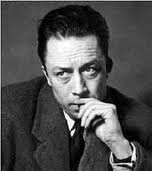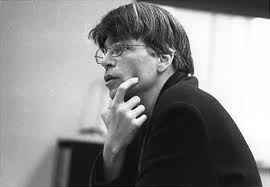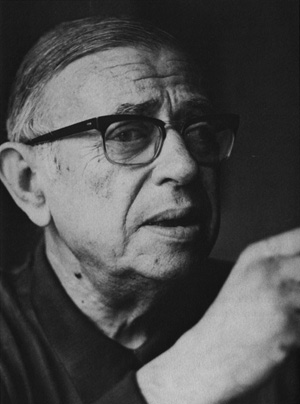Serendip is an independent site partnering with faculty at multiple colleges and universities around the world. Happy exploring!
Week Ten (Tues, Mar. 29): The Geneology of Generosity, The Progeny of The Plague
 Albert Camus |
 Richard Powers |
I. Coursekeeping
finish The Plague for next Tuesday's discussion
Paul on the larger world and our forum...?
Japanese Rules for Nuclear Plans Relied on Old Science: “We can only work on precedent, and there was no precedent.”
Review of Future Babble: "the future is deeply, intrinsically unknowable."
Paul Krugman @ HC y'day afternoon:
"The world is a complicated place.
It is difficult to make predictions of real events.
Nothing is forever. Stuff will change. Events will come along.
None of us is omniscient. It is always possible to be wrong.
Being a responsible adult is acting even if you don't know you are right. Economics is not a morality play."
II. In that context (;) I want to begin
today with a couple of stories "not told."
Many different "stories" can be told about
the intersection of biology and culture.
In the mid-term evaluation, for example, alexandra and AnnaP both said that they would have liked to learn a little more about Social Darwinism. That's not a topic we've attended to here, in part because I/we don't see that as a particularly generative offshoot of Darwinism: It is a description of social evolution most often used to justify established social hierarchies (i.e.: those social groups that are flourishing are "most fit" to do so). As a defense of "what is," it has been used to justify laissez-faire social policies, eugenics, scientific racism, imperialism....
Can you see why we might not focus our discussion on this topic....?
(Why did you want to learn more about it...?)
III. There's another road "not taken" in this course, which has been mapped out by a group known as The Literary Darwinists (NYTimes, Nov. 6, 2006):
"human beings... are biological critters, products of evolution by natural selection.... we unconsciously behave in ways designed to enhance our success.... These behaviors are the stubborn, indelible core of human nature.... If there is a single take-home lesson to be derived from the progress of biological science...it is continuity" (Barash and Barash, Madame Bovary's Ovaries: A Darwinian Look at Literature, 2005).
"Literary Darwinists" see evolution as promising "universal explanations" by the use of a single "explanatory tool," "providing literary criticism with the 'foundational principles' for analysis it lacks."
They include Brian Boyd, Joseph Carroll, Ellen Dissanayake, Nancy Easterlin, Jonathan Gottschall, Robert Storey, and Michelle Sugiyama who, fueled by “realist notions of clarity and centralized control," assume that “culture can be reduced to an effect of biology," an assumption that “stokes the realist fantasy of monocauses and causal stasis and stability."
Our project here has been different: we've been arguing that the shared study of evolution and literature is productive, not because it encourages explorers in both areas to focus on "foundational principles" and "universal explanations," but because it serves to highlight the underlying processes of diversity generation.
...the resulting fertility and richness fuels the unpredictable and productive evolution of (both biological and) literary forms.
IV. AnnaP: I’m hoping that we’ll explore why certain texts seem to stick around while other fade away and the importance of specific genres and mediums as they might have changed over time.
Dawn's "literature review" of adaptation studies:
pioneering work focused on the relationship
between films and their literary antecedents
the field inherited evaluative presumptions
(about fidelity, hierarchy and canonicity)
from literary studies ....
There are other avenues open to us.
For example, you missed (!) the visit to campus last fall of Wai Chee Dimock, who in "Genre as World System: Epic and Novel on Four Continents" Narrative 14, 1 (January 2006) advocates a paradigm of "distant reading," so named because of its clear opposition to the better known, "close" variety: "distant reading is meant to track large-scale development; it is not meant to capture the fine print."
the co-evolution and cross-fertilization of literary forms,
tracing regularities as far back as possible, replacing...
linear models of supersession with a fractal model of looping:
recursive kinship... survival as a spilled-over phenomenon
The prime practitioner of this sort of literary study is Franco Moretti, Graphs, Maps, Trees: Abstract Models for a Literary History (2007)
(who was supposed to come to campus this spring, but isn't!)
studying the "history of the novel as planetary form"
some of his work is verges on social Darwinism:
"...the literary market is like: ruthless competition--hinging on form. Readers discover that they like a certain device, and if a story doesn't seem to include it, they simply don't read it (and the story becomes extinct)."
example of Arthur Conan Doyle's devices: "The most important clues take the form of secondary facts, presented in such a way that the reader does not notice them... intentionally placed in the oblique form of a subordinate clause... on which the storyteller does not dwell."
some of Moretti's work goes much further:
"Theories concretely change the way we work... they allow us to enlarge the literary field, and re-design it in a better way, replacing the old, useless, distinctions (high and low; canon and archive; this or that national literature...) with a new temporal, spatial and morphological distinctions."
a clear preference for explanation of general structures over the interpretation of individual texts ....a materialist conception of form... opening new conceptual possibilities
For example: the "Tree of Culture"
![]()
The course of organic evolution can be portrayed properly as a tree of life, as Darwin has called it, with trunk, limbs, branches, and twigs. The course of development of human culture in history cannot be so described, even metaphorically. There is a constant branching-out, but the branches also grow together again, wholly or partially, all the time. Culture diverges, but it syncretizes and anastomoses too.... The tree of culture... is a ramification of such coalescences, assimilations, or acculturations. This schematic diagram visualizes this contrast. (Alfred Kroeber, Anthropology)
of his "Tree of Culture" with both
Darwin's "fans" and Paul's doubletrees:
|
|
Moretti: "interconnected and branching; syncretism and divergence... a cycle to which they both contribute in turn. Convergence... only arises on the basis of previous divergence, and its power tends... to be directly proportional to the distance between the original branches... conversely, a successful convergence usually produces a powerful new burst of divergence.
(What Moretti does w/ Emma Bovary: uses her as a stage in the development of the "indirect free style": "emotions plus distance"--> "the voice of the well-socialized individual... who speak of themselves in the third person, as if from the outside...); or how we can describe our lives in words, in order to look @ them (and change them?)
Christopher Prendergast, "Evolution and Literary History: A Response to Franco Moretti." New Left Review 34 (July-August 2005):
Moretti is interested in the analysis of change...
what counts for Moretti is less origins than outcomes
Moretti's aim is explanatory: 'take a form, follow it from space to space, and study the reasons for its transformation'... quoting the biologist, Ernst Mayr, the reasons are 'the opportunistic, hence unpredictable' reasons of evolution.
placing a very large bet on bringing the laws of nature and the laws of culture far closer than they are normally thought to be. This is his most audacious gamble.
culture is both convergence and divergence, but it is divergence which, in the play of his argument, is given greatest prominence
how might you design a course of study, or a course, or
just a module of one, to illustrate (or test?) this idea?
(now at the Elizabeth A. Sackler Center
The Dinner Party, by Judy Chicago
selected 1038 women in western history
inscribed names of 999 of them on porcelain floor tiles
honored 39 of them w/ symbolical place settings @ a table:
each one got a china plate in a vulvar form,
elaborate needlepoint runner worked in period techniques,
narrating her life
used to figure/literally/what this course is about/
what associated courses might do/
what it means to do cultural evolutionary studies:
who would you seat @ the table, and how would you figure the
relationship between them? (imagine my dividing you now into groups of three to take on this task...)
VI. So: out of all these possibilities in the cultural landscape (and given the fact that we want to figure for you the complexity of this cultural landscape) why Powers? How might his novel in particular contribute to our story of cultural evolution? What "convergence" or "divergence" does he represent in the story we are telling?
ckosorek: What is the Fate of the Novel? it seems that our society "selects" the concise... against execution and length.
katlittrell: what's the point of fiction if there is no emotional connection?
vlopez: I share the same confusion as you:...connection is necessary, you need to engage the reader.... I did not feel engaged by this novel at all; I wanted to just stop and move on.
kgrass: what we crave in fiction is the ability to lose ourselves in someone else’s world, and Powers kept bringing us back to reality.
AnnaP: many people are either bored by, disenchanted with, or skeptical of Powers's writing style, preferring the "beloved novel" that they could pick up and lose themselves in.... I wonder if as a class we occasionally become like Stone, remaining rooted in a somewhat traditional idea of what writing is or should be while all the while resisting new forms and mediums.... people know what they lose in reading Generosity - identifying with the characters, losing ourselves in the plot - but what do we gain? Does Powers's novel give us something that others haven't yet?
Are we ourselves s-l-o-w-i-n-g
the evolution of literary forms?
Are we s!t!o!p!i!n!g! evolution??
VII. So: let's step back to see "where Powers came from."
How do you understand the relationship of his text to Camus's?
Having begun The Plague, do you now
understand this passage in Powers' novel?
"He keeps himself awake listening to an audiobook of The Plague, the novel that defeated him at Stanford.... You want to devote your life to life science? Read this first. He's gone back to Camus after talking with Thassa.... She filled him in on all the context.... She quoted the author's notorious declaration, at the height of the savage war: If I have to choose between justice and my mother, I would choose my mother .... Thomas finds him blindly humane (pp. 248-9).
"The Plague ends... "the bacillus never dies... it bides its time... and perhaps the day would come when, for the bane and the enlightening of men, it would rouse up its rats again and send them forth to die in a happy city" (p. 250).
????????
What role is that story playing within this story?
Why does Powers call his novel Generosity?
Lethologica: words evolve just as much as anything else does.
Powers seems to agree: I need a genealogy for the word. It comes through the loins of that giant Latin gens.... the original root of the thing has spread its genes into an absurd number of offspring: genial, genital, genre, gentle, general, generic, germane, germinate, engine, generate, ginger, genius, jaunty, gendarme, genocide, and indigenous, while scattering cousins as far afield as cognate, connate, nascent, native, nation, children, kind. Generous to a fault. Too many progeny for any paternity test. A heterogeneous word... genomicists will soon be able to trace a full lineage for any person with more journalistic precision than the dying race of philologists have ever been able to trace a given word's more recent journey (Generosity, p. 85).
ajohnston: On Tuesday we discussed whether or not it was productive to focus on individuals, reflecting on Kurton’s dislike of fiction’s focus on the singular rather than the collective. I wonder how the broader concept of “generosity” complicates this question?
tangerines: Thassa's happiness springs from the fact that she finds joy in giving... her happiness springs from her generosity.
Naming his novel Generosity may be one way Powers marks it as one of the many descendents of Albert Camus:
In his 1956 essay The Rebel Camus... set a standard of high idealism... the genuine act of rebellion reflected "insane generosity... which unhesitatingly gives the strength of its love and without a moment's delay refuses injustice. Its merit lies in making no calculations."
Essay: for what is the plague a successful metaphor?
plague is essentially random… it is not... man's 'fault'.... "It can be explained, if at all, only by saying that the universe makes no sense whatsoever if you look at it in terms of human ideas of right and wrong" ....
Camus argued he wanted The Plague "to be read on a number of levels... has as its obvious content the struggle of the European resistance movements against Nazism".... The Plague "does represent, beyond any possible discussion, the movement from an attitude of solitary revolt to the recognition of a community whose struggles must be shared.... there is an evolution ... towards solidarity and participation."
vlopez on Generosity: We are all interdependent and this is mainly what I got from this book.
The context for this shared struggle, in an absurd universe, is a philosophy known as existentialism. What's that?
 |
 |
Satre, "Existentialism and Humanism"(1948):
If one considers an article of manufacture--as, for example, a book or a paper-knife--one sees that it has been made by an artisan who had a conception of it; and he has paid attention, equally, to the conception of a paper-knife and to the pre-existent technique of production which is a part of that conception and is, at bottom, a formula. Thus the paper-knife is at the same time an article producible in a certain manner and one which, on the other hand, serves a definite purpose, for one cannot suppose that a man would produce a paper-knife without knowing what it was for. Let us say then of the paper-knife that its essence--that is to say the sum of the formulae and the qualities which made its production and its definition possible--precedes its existence. The presence of such-and-such a paper-knife or book is thus determined before my eyes. Here, then, we are viewing the world from a technical standpoint, and we can say that production precedes existence.
When we think of God as the creator, we are thinking of him, most of the time, as a supernal artisan.... when God creates he knows, precisely what he is creating. Thus, the conception of man in the mind of God is comparable to that of the paper-knife in the mind of the artisan: God makes man according to a procedure and a conception, exactly as the artisan manufactures a paper-knife, following a definition and a formula.... Man possesses a human nature; that "human nature," which is the conception of human being, is found in every man; which means that each man is a particular example of an universal conception, the conception of Man....
Atheistic existentialism, of which I am a representative, declares with greater consistency that if God does not exist there is at least one being whose existence comes before its essence, a being which exists before it can be defined by any conception of it.... man first of all exists, encounters himself, surges up in the world-- and defines himself afterwards. If man as the existentialist sees him is not definable, it is because to begin with he is nothing. He will not be anything until later, and then he will be what he makes of himself. Thus, there is no human nature, because there is no God to have a conception of it. Man simply is. Not that he is simply what he conceives himself to be, but he is what he wills, and as he conceives himself after already existing-- as he wills to be after that leap towards existence. Man is nothing else but that which he makes of himself. That is the first principle of existentialism.
Philosophy Professor: Albert Camus
- Absurdity lies in the opposition between the human need for meaning, on the one hand, and the unconcerned and meaningless world, on the other.
- The presence of the absurd makes the problem of suicide the most fundamental philosophical question.
- The absurd does not dictate death; what gives life its value is the consciousness of the absurd together with the revolt that consists in a defiant heroism that resists injustice.
- By rebelling against the absurd conditions that waste life - whether they be social, political or personal - the rebel shows solidarity with other persons and encourages the struggle for a more human world.


